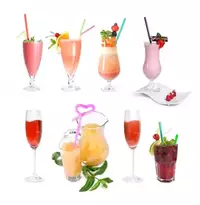Cocktails

A cocktail is a type of alcoholic and non-alcoholic beverages that are obtained by mixing different ingredients. Legend has it that the drink cocktail appeared for the first time in America during the Civil War of Independence. Documentary evidence confirms that in 1806 a record was left of the receipt of cocktails at the warehouse of the city of Columbia, South Carolina.
The cocktail received its distinctive name thanks to the rooster. The whole point is that the first cocktail was made by a bartender in honor of the soldier who found his favorite rooster. Therefore, the owner of the bar decided to thank the brave military with the best refreshing drink and mixed the bitter tincture with homemade wine and whiskey. Everyone toasted "Cock's Tail, " which means cocktail in English. Since then, bartenders around the world have been mixing drinks to get a cocktail.
Types of cocktails
All cocktails are divided into two large categories - alcoholic and non-alcoholic drinks. Medicinal drinks, for example, oxygen cocktails, are distinguished into a separate category. In turn, the following types of cocktails can be distinguished, which contain alcohol:
aperitifs or drinks that are served before eating and are intended to arouse appetite;
hot cocktails, which are served with a "light, " i. e. ignite alcohol before drinking the drink;
digestives or drinks that are drunk during or after a meal;
julepas or drinks based on fresh mint;
collins or an alcoholic cocktail with sugar syrup and soda water;
Cobler, which means "fruit salad" refers to rather unusual types of cocktails, the drink is characterized by a large content of fruits;
long drink or drinks that serve as a refreshment are usually served with ice;
fiz is a sparkling refreshing drink to which carbonated water and ice are typically added;
fix or strong alcoholic cocktails with lemon juice;
sour or sour American alcoholic cocktail based on lemon juice;
layered cocktails are considered the top of the bartender's skill, all the ingredients of the drink are "put" into the glass in layers;
eg-leg or alcoholic cocktail with raw egg and strong alcohol;
beer cocktail or flip;
punch and crouchon;
highball or mineral water cocktail;
The most famous types of non-alcoholic cocktails include:
milkshakes, come with the taste of strawberries, vanilla, chocolate, caramel, fruits, etc. ;
a sherbet or sorbet beverage based on ice from fruit juice;
a fruit cocktail is made with ice-infused fruit juice;
smoothie or milkshake with fruit juice;
Composition of cocktails
The composition of cocktails depends primarily on the subspecies of the drink. Usually strong drinks (gin, whiskey, rum, tequila, etc. ) are used in alcoholic cocktails. In addition, liqueurs, various spices, syrups, as well as milk, cream and honey are often involved in alcoholic beverages. In cocktails that do not contain alcohol, milk, fruit juice, ice or ice cream are most often used.
The benefits of cocktails
It is also worth talking about the benefits or harms of cocktails in the context of the product's species range. You could say there is a clear benefit to cocktails based on fresh fruit, juice and milk. Such a non-alcoholic cocktail will be not only an excellent cool, but also a vitamin drink. Some alcoholic beverages are also endowed with beneficial properties. For example, the benefits of cocktails based on wine, cognac, spices and lemon juice have long been used by people in the fight against colds. After all, mulled wine, grog or punch refers to cocktails.
The harms of cocktails
Cocktails with alcohol can cause irreversible and significant harm in the event of uncontrolled consumption of drinks. Some cocktails are distinguished by their strength, so frequent or daily drinking of alcoholic beverages will lead to the development of a number of diseases, including alcoholism.
cocktails 350 kCal
Energy value of cocktails (Ratio of proteins, fats, carbohydrates - ju):
Proteins: 18 g (~ 72 kCal)
Fats: 7 g (~ 63 kCal)
Carbohydrates: 25g (~ 100kCal)
Energy ratio (bj | y): 21% | 18% | 29%
 Español
Español Français
Français Português
Português Русский
Русский 简体中文
简体中文 繁體中文
繁體中文 日本語
日本語 한국어
한국어 العربية
العربية Türkçe
Türkçe Қазақ
Қазақ Deutsch
Deutsch Italiano
Italiano Українська
Українська
